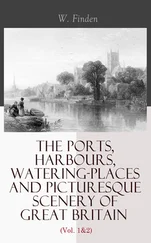It was possible that Whicher's speculations were no better founded than those of any other observer of the crime. Detectives, like phrenologists, might be masters of mystification, men who cloaked common sense in complexity, dressed up guesses as science.

CHAPTER SEVEN
SHAPE-SHIFTERS
18 July
The warm weather held on Wednesday, though clouds passed over the West Country in the afternoon, obscuring a partial eclipse of the sun. The local police maintained a strict surveillance on Road Hill House, and distributed a thousand handbills advertising the PS200 reward for information that led to the conviction of Saville's murderer.
Whicher broadened his inquiries further. He took the train from Trowbridge to Bristol, and hired a cab for two hours in Bath. There he interviewed the police and the owner of the Greyhound Hotel about an odd episode that had taken place four years earlier, in July 1856.
The Kents had by then been living in Road Hill House for about a year. The second Mrs Kent was eight months pregnant with Saville. Constance and William, aged twelve and eleven, were both home from boarding school for the holidays, Constance apparently afflicted with weak ankles. A doctor advised that she wear laced stockings and avoid exercise. When the family visited Bath for the summer flower show she was pushed around in a wheeled chair.
One day Constance and William ran away. In the privy in the shrubbery on 17 July Constance changed into some of William's old clothes, which she had mended and hidden for this purpose. She then cut off her hair and threw it, with her discarded dress and petticoats, into the vault of the privy. She and William planned to go to sea as cabin boys, and were headed for Bristol. Like their older brother Edward, they hoped to flee the country. The two walked the ten miles to Bath by evening. When they tried to get a room for the night at the Greyhound Hotel, the innkeeper suspected that they were runaways, on account of their fine clothes and manners, and questioned them closely. Constance was 'very self-possessed, and even insolent, in her manner and language', Stapleton recounted, but 'William soon broke down, and burst into tears'. William was put to bed in the hotel, according to Stapleton, and Constance was handed over to the police. She spent the night at the station house, where she kept a 'determined silence'.
The reports of this incident in local papers differed from the account given by Stapleton, who may have emphasised William's sensitivity in order to play up Constance's dominant nature; the source for his account was almost certainly Samuel Kent. In one newspaper, which characterised the episode as 'an instance of extraordinary affection and adventurous daring', William did not break down in tears and Constance was not rude. They were both 'exceedingly polite' when interrogated by the landlord, simply repeating that they were going to sea. William was taken to the station. They kept their secret until the morning, when a servant from Road Hill House arrived in Bath and identified the children, complaining that he had worn out three horses searching for them.
William confessed to the police that he had run away from home, claiming that he had instigated the escapade: 'he desired to go to sea, he said, and his companion, his younger sister, had dressed herself in his clothes, and cut her hair short in order to accompany him to Bristol, where he hoped to be taken as cabin boy by some good-natured captain. All the money which they possessed was eighteenpence, but neither want of cash nor distance had been able to overcome the boy's determination or the sister's affection.' Another report also gave Constance the role of sidekick and William that of protector: 'the boy wanted to go to sea and entrusted his secret to his sister . . . whose ardent affection determined her to accompany him at all hazards'. She 'allowed him to cut her hair, which was then parted at the side'.
Stapleton and the Bath reporters agreed on Constance's unusual resolve, though they appraised it differently. According to one of the newspapers, 'The little girl, we are told, behaved like a little hero, acting the part of a boy to the admiration of all who saw her. We learn from Mr Inspector Norris . . . that Miss Kent manifested great shrewdness and resolution. The boy's clothes she wore were small for her, and she carried a small stick, which she used as if she had been accustomed to it. It was some time before he suspected that she was of the female sex, which he only discovered by a peculiarity in her mode of sitting.'
The servant took the children home. Samuel was away on a business trip, inspecting factories in Devonshire, but he returned to Road that afternoon. William 'at once expressed the greatest sorrow and contrition, and sobbed bitterly', according to Stapleton. But Constance refused to apologise to her father or her stepmother. She would say only that she had 'wished to be independent'.
It was, observed the Bath Express , 'a most strange circumstance in a delicately nurtured gentleman's family'.
When he had finished his inquiries in Bath on Wednesday, Whicher went by railway to Warminster, five miles east of Road, to speak to one of Constance's schoolfriends.
Emma Moody, fifteen, lived in a house in Gore Lane with her brother, sister and widowed mother, all wool-workers. Whicher showed Emma the breast flannel, which she said she had never seen before. He asked her if Constance had ever spoken about Saville.
'I have heard her say she disliked the child and pinched it, but it was done in fun,' said Emma. 'She was laughing at the time she said it.' When asked what made Constance tease the younger children, Emma said, 'I believe it was through jealousy, and because the parents showed great partiality.' She explained: 'I said upon one occasion, when we were talking about the holidays - we were going for a walk towards Road - I said, "Won't it be nice to go home so shortly?" She said, "Yes, perhaps it may be to your home, but mine is different" . . . She said that the second family were much better treated than herself and her brother William. She said this on several occasions. We were talking of dress at one time, and she said, Mamma will not let me have what I like. If I said I would have a brown dress she would let me have black, or just the contrary.' As Constance saw it, her stepmother felt such spite towards her that she was denied even the choice between black and brown. Like the coarse nightdress, the drab clothes cast Constance as a wronged and humiliated stepdaughter, a Cinderella shut out of the world of the other girls.
According to Whicher's reports to his superiors, Emma claimed to have often heard Constance express her aversion to Saville, on the grounds that he was so favoured by Mr and Mrs Kent. Once, Emma said, she remonstrated with Constance on this subject, 'telling her how wrong it was to dislike the child on that account as it was not his fault'. To this Constance replied, 'Well perhaps it is, but how would you like it if you was in my place?'
Whicher's job was not just to find things out, but to put them in order. The real business of detection was the invention of a plot. Whicher believed he understood Constance's motive: she killed Saville because of the 'jealousy or spite' she felt towards her stepmother's children, working upon a 'mind somewhat affected' by madness. The treatment of the first Mrs Kent could have stirred her youngest daughter into vengefulness. The second Mrs Kent, the woman who had brought Constance up as her own only to reject her once she bore children herself, might have been the object of the girl's rage.
Читать дальше













